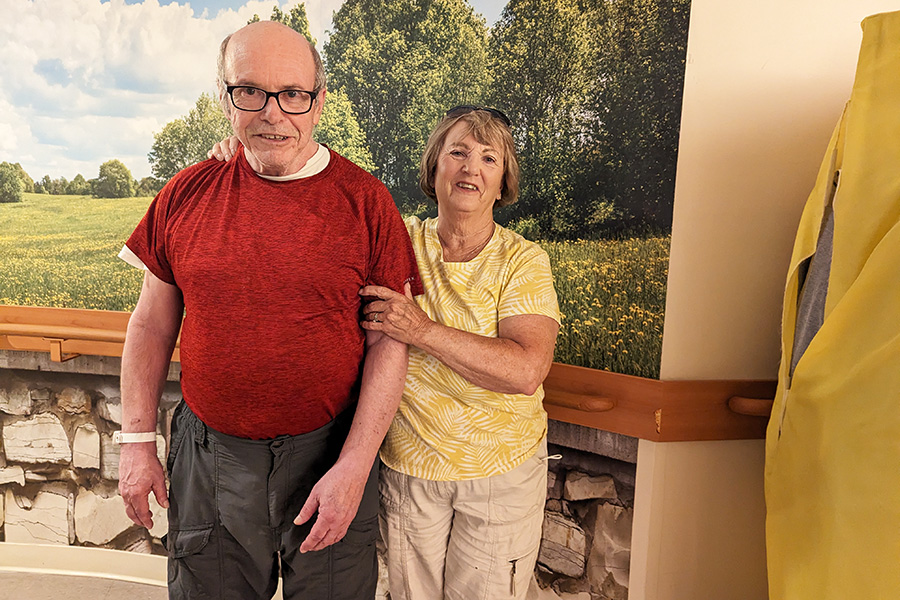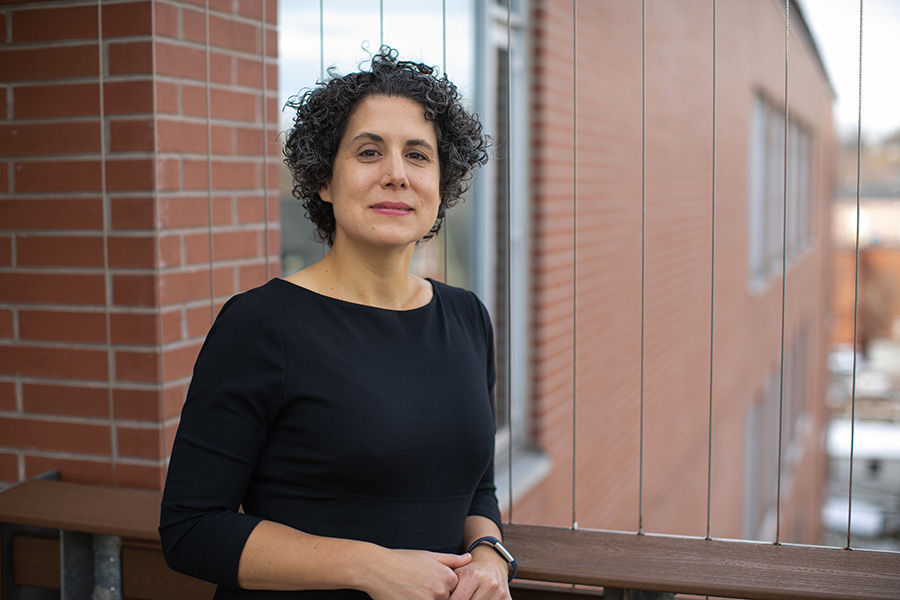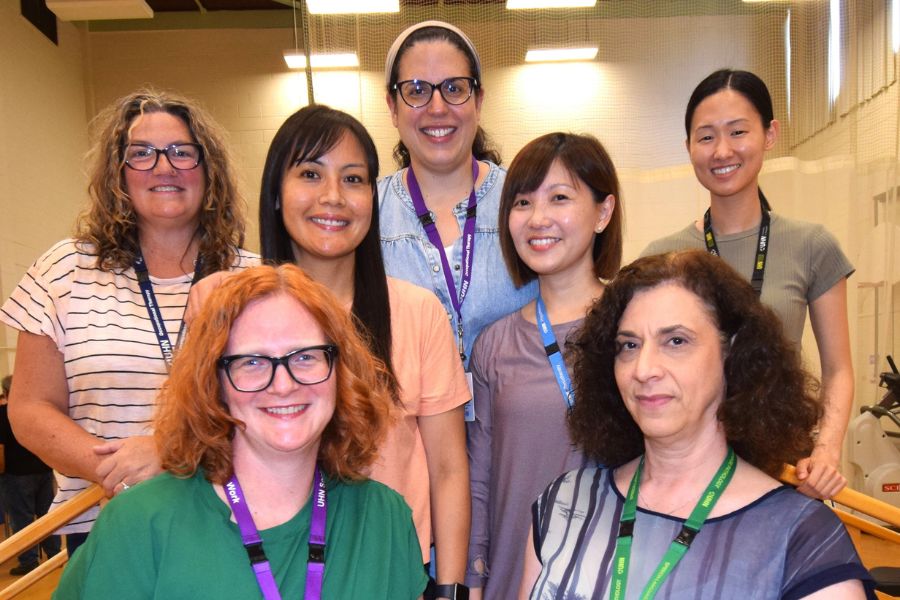
Robert Harker was an active member of a day program located on the same campus of the long-term care (LTC) home where he lives, when symptoms of his dementia started to intensify.
That resulted in responsive behaviours, such as verbal intimidation, which were potentially putting him and others at risk in the day program, and in his residential home area in the LTC.
When staff called his sister, Norma, who is also his substitute decision maker, the message was gentle but clear: if it kept happening, they’d have to transfer Robert to the hospital, where he would find the right psychiatric care. However, they said, he did need to be removed from the day program, which was a place offering him additional opportunities for social engagement and recreational activities.
“I understand you can’t have someone being aggressive in that type of environment,” Norma says. “But at the same time I started to worry, thinking: ‘he needs this – what will happen to him?'”
In the meantime, the nursing team at Robert’s LTC, Shepherd Lodge, started working behind the scenes, searching for person-centred solutions. That included connecting with Baycrest’s Virtual Behavioural Medicine (VBM) program and the team at Toronto Rehab.
The result was dramatic. Within two months, Robert’s symptoms were being effectively managed, and Norma rests easier, knowing that her brother can continue to live comfortably in his own community.
Toronto Rehab offers an inpatient Specialized Dementia Unit (SDU) and outreach services, to better support adults with advanced behavioural symptoms of dementia.
Harnessing the power of technology to revolutionize rehab
It’s also the newest partner in Baycrest’s VBM program – an integrated service between Baycrest’s Pamela & Paul Austin Centre for Neurology and Behavioural Support, Inpatient Behavioural Neurology Unit, and Toronto Central Behavioural Support for Seniors Program (TC-BSSP).
The VBM team sees patients through virtual visits over secure video networks, allowing patients to gain psychiatric support, in place, from wherever they call home.
“We’re excited to be able to offer this new, innovative approach to patients because there is a growing need for our specialized services to support long-term care centres,” says Dr. Andrea Iaboni, geriatric psychiatrist at Toronto Rehab and Senior Scientist at UHN’s Kite Research Institute.
“This program allows us to use the expertise we’ve developed on the SDU to help more people – and help them faster.”
For Robert, that included his team of nurses and care providers at Shepherd Lodge and a lead from Behavioural Support Ontario, connecting for weekly virtual sessions with Dr. Iaboni, a pharmacist colleague, and two nurse practitioners (NPs).
When possible, Robert and Norma would join the sessions, too.
“The family side of the story is very important for us to make sure we’re treating the ‘whole’ patient and understanding their goals,” says Lynn Haslam-Larmer, one of the two NPs who started working with the SDU team as a geriatric psychiatry postdoctoral fellow.

During the initial consult, the VBM team members say, “Take us through the day.” They want to know what’s happening, how often, what the individual’s triggers for the undesired behaviours are, and what coping strategies have already been tried.
If medications have been tried, the team will look at what’s working and what’s not, and if they can align the medications to better suit the person’s behavioural patterns to optimize their effectiveness.
“We’re always thinking and working with the LTC home to understand what they’re doing now and what they can do differently,” says Lynn.
After the initial consult, the team from Toronto Rehab sends their recommendations to the LTC team, and then the NP regularly connects with the home for status updates.
“That’s where our team really shines,” says Lynn.
“We reach out weekly, and we’re on top of it. If things aren’t going well, we can loop in the pharmacist or geriatric psychiatrist in real time. It’s a faster response.”
VBM recommendations can help manage a resident’s symptoms in the LTC and avoid admission to the SDU.
In Robert’s case, adjusting his medications helped address the feelings leading to his verbal outbursts.
“Robert was getting agitated because he was feeling anxious,” says Lynn.
Developing new models of collaboration
“Every behaviour is a response to something else. If we can figure out why a patient is feeling anxious, scared or resistant to care, we can respond and help manage those behaviours.”
The team members at Toronto Rehab say they know their work is done when the LTC staff feel armed with effective behavioural strategies, and the intensity and frequency of a patient’s responsive behaviours have reduced to the point where they no longer require one-on-one attention in LTC.
They also feel good knowing staff in the LTC feel supported.
“We see ourselves as complimentary to their work – walking with them, as they embrace our suggestions and try new things,” says Lynn.
Robert’s success story demonstrates what is possible through partnerships within the health care community.
“We are proud to expand Baycrest’s VBM program through this new partnership with Toronto Rehab,” says Scott Ovenden, President and CEO, Baycrest Hospital and Long-Term Care Home.
“The growth of this sector-leading program showcases the collaborative relationship with our system partners and our unified goal to provide innovative solutions for more individuals living with dementia.”
It’s also a reflection of the impact programs such as the VBM can have on the patient experience, hospital capacity and expertise within an LTC environment.
“This new, innovative service has the potential to support more patients with dementia and responsive behaviours in their long-term care home and over time to build the skills and capacity of long-term care staff,” says Dr. Iaboni.


